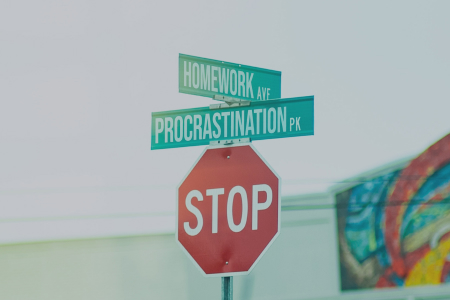
How to stop putting things off
The number of chronic procrastinators has quadrupled over the past 25 years. Why is there a procrastination epidemic?
Home » Productivity » How to make your brain make better choices

In startup communities, entrepreneurial stress is pervasive and sometimes even deadly.
Researchers first started paying attention to entrepreneurial stress a few years ago, when a series of suicides revealed that the startup community is suffering from a depression epidemic.
A recent survey of 242 entrepreneurs revealed that 49% of startup founders suffer from a mental health condition, and 1 out of 3 live with depression. The problem has gotten so bad that Y Combinator startup 7 Cups of Tea has opened a free online therapy hotline for startup founders.
While studies suggest that genetics are partially to blame for the crisis, the nature of entrepreneurial stress plays a major role in pushing founders over the edge. If you plan on starting your own business, learning the right stress management techniques is an absolute must.
Decisions are the stuff of life. Every day we make a ton of decisions without even thinking about it – what to eat, what to wear, whether we want to have sex, or eat a whole pizza and pass out. And it’s not limited to our personal lives.
Business and work are almost exclusively about making decisions. If you don’t have to make a lot of decisions at your job, watch out – you’re probably about to be replaced by a robot.
The problem is that we don’t actually have much control over our decision-making process.
There are two main reasons for this:
First, evolution has molded the human brain into a complex mechanism that often contradicts itself.
Second, even when we think we’re being rational, our decisions are strongly affected by our physiology.
This means our lives are driven by constantly repeating a process we don’t know how to control or even execute properly.
In fact, studies show that bad habits and addictions stem from poor decision-making caused by abnormal interactions between various areas of the brain responsible for making decisions. And a 1979 experiment by psychologist Benjamin Libet revealed that we only have about 200 milliseconds to veto an action before our primal instincts kick in.
Understanding how to control the decision-making process is essential. It can give us the power to break patterns of behavior and change our lives for the better.
The short answer is that we don’t know for sure, and what we do know is pretty scary. Our brain is a product of evolution. What we have inside actually looks like 3 different brains: the lizard brain, the mammalian brain (the limbic part of the brain), and our learning brain.
The learning brain contains the prefrontal cortex, which is our center of rationality and mindfulness. We don’t always use this part of the brain. We have the Reticular Activating System (RAS), which is like a toggle switch between the prefrontal cortex and the limbic system.
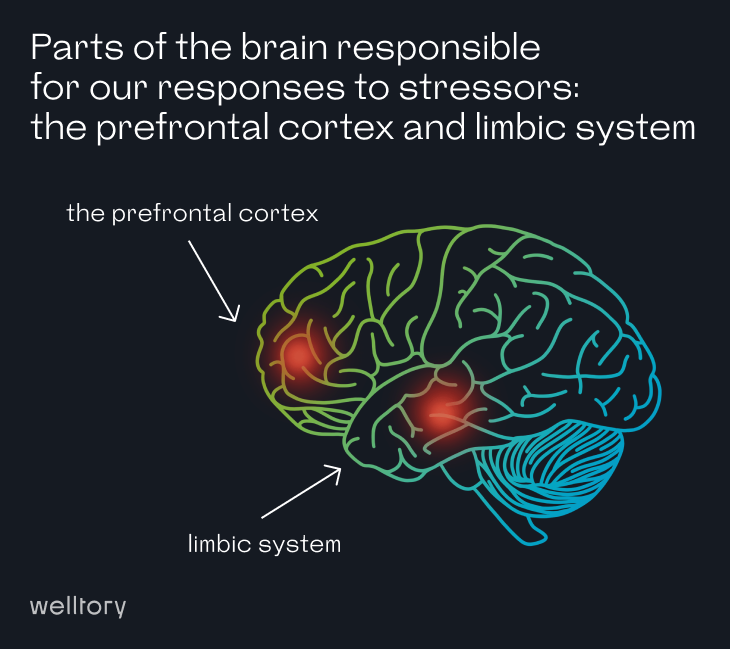
When we are emotionally charged or stressed, it switches to our limbic system. The switch makes our brains go into auto-pilot mode. Our instincts take over and we stop thinking, falling back on pre-set reactions or answers we learned from previous experiences. This is usually when we fall victim to cognitive biases.
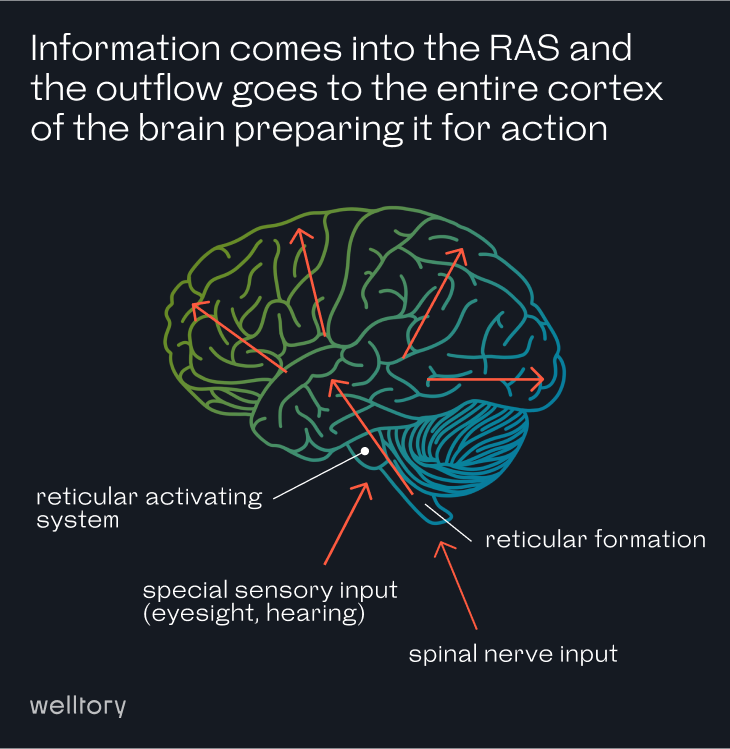
When we are relaxed, the RAS switches us back to the cerebral cortex so we can act rationally.
Although we can’t always predict what will cause the RAS to flip the switch, psychologist Martin Moore-Ede says there are about nine common triggers:

For startup founders, top stressors include:
Not really. More than 90% of the decisions we make are not rational. In his book Thinking, Fast and Slow, Professor Daniel Kahneman explains that we have two systems for thinking and making decisions. One is rational, and the other one is intuitive.
The rational system is connected to the prefrontal cortex of the brain and is capable of in-depth analysis and logical thought. It is also extremely lazy and can only perform one task at a time.
If you want to test your ability to focus on more than one task at a time, try the selective attention test by Chris Chabris (Union College, New York) and Daniel Simons (University of Illinois). The intuitive system is fast, automatic, and extremely powerful. This system is a great multi-tasker and is responsible for most of the things you say, do, and think.
Most of our decisions are made on auto-pilot and rationalized by our logical brain after with a coherent, plausible explanation. Professor Kahneman’s discoveries were so groundbreaking that he was awarded the Nobel Memorial Prize in Economic Sciences in 2002.
Our decision-making process is the product of evolution.
How do we know? Monkeys have the same cognitive biases as humans. Dr. Laurie Santos, a psychologist at Yale University, has been investigating how deep seated these cognition mistakes are. In a series of experiments called Monkeynomics, Dr. Santos taught a troop of monkeys to use money. It turns out monkeys fall victim to the same cognitive biases. For example, they exhibit loss aversion – the tendency to prefer avoiding losses to acquiring equivalent gains.
If our biases and irrational decisions are so deeply rooted in our evolutionary past, they may be impossible to change.
“What we learn from the monkeys is that if this bias is really that old, if we really have had this strategy for the last 35 million years, simply deciding to overcome it is just not going to work,” Dr. Santos explains, “We need other ways to make ourselves avoid some of these pitfalls.”
So knowledge is power. While we may not be able to change ourselves, being aware of our cognitive limitations can give us the power to reduce irrationality.

Because it’s trying to preserve energy. All biological systems conserve energy in order to guarantee survival. This may seem strange in a world where you can find food on every street corner, but our bodies live by the same laws they did 35 million years ago.
25% of the energy your body generates is consumed by your brain, and decisions that require willpower or self-control are huge energy drains. Studies show that exercising willpower takes a heavy toll on mental energy levels and glucose levels – the brain’s preferred type of fuel. This is one of the reasons you’re more likely to eat a whole bag of chocolate chip cookies when you’re stressed.
Our first impulse is always to use the intuitive system of thinking, or the limbic part of the brain. Then, all we need to do is make out impulsive decisions look rational.
Voila! Energy is preserved and our ego is left intact.
For our brain, the best decision is not having to make a decision at all. The next best thing is to use a pre-set template or go with the default option. These kinds of decisions don’t suck up a ton of energy. This is why we frequently end up going with the default option and put off making a decision as long as possible.
Dan Ariely, Duke University professor and author of Predictably Irrational, talks about our love of default options in his TED talk.
Take a look at organ donor statistics for EU countries:
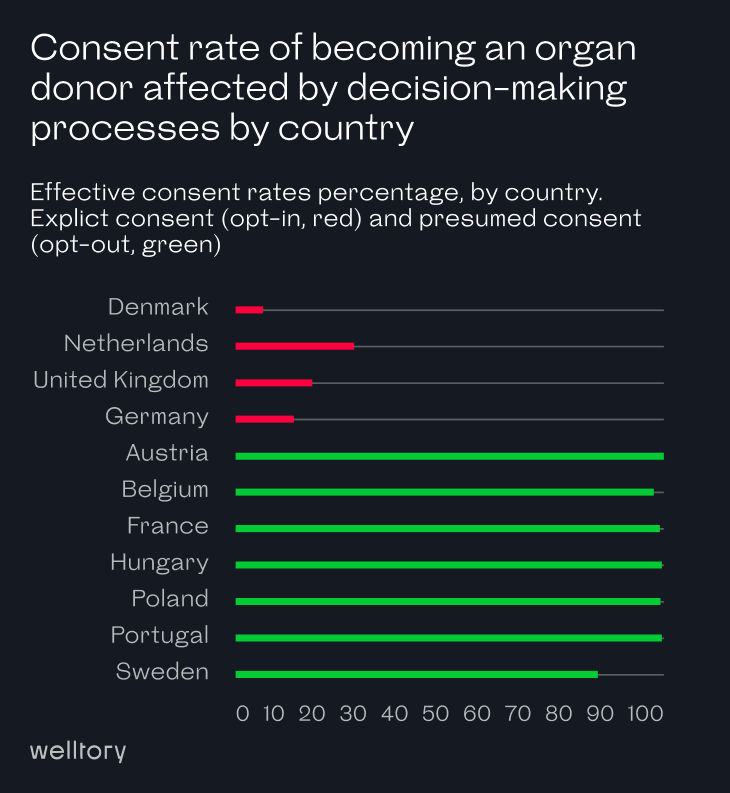
Why are people from Denmark, the UK, the Netherlands, and Germany so hesitant to be organ donors? The answer is more simple than you think. In these countries, people have to check a separate “Organ Donor” box on their driver’s license application if they want to be an organ donor. In other countries shown in the chart, people have to check a box if they DON’T want to be an organ donor.
The majority of people prefer to not make any decision at all and simply go with the default option. We also hate having too many choices – a phenomenon called choice paralysis or analysis paralysis. We end up choosing anything just to get the process over and done with or running in the opposite direction.
For example, a study by Sheena Iyengar, Professor of Business at Columbia University, showed that shoppers were less likely to buy jam when they had more options to choose from. In the study, 30 percent of shoppers ended up making a purchase when the selection was limited to 6 types of jam. However, only 3 percent made a purchase when there were 24 types of jam to choose from.
Making decisions is simply too much work. That’s why our brains opt out of making them whenever they can.
When we try our best to focus, the results can be even more disastrous. Something to be aware of is a cognitive bias called the law of the hammer, which is when we rely too much on a tool that we’re familiar with. This often happens to doctors, who sometimes overprescribe surgeries or medicine simply because it’s a tool they frequently use to treat patients.
For example, a 1934 American Child Health Association study sent 1,000 children who had screened negatively for tonsillectomy in for further assessments. About 45% of the children were assessed as requiring a tonsillectomy. This happened because the screeners were not diagnosing objectively, but relying on their expectation that 45% of the children they saw would require a tonsillectomy.
Absolutely. Mornings are the best time to make decisions. The main reason is that every decision we make drains our energy, which means that we experience a phenomenon called “decision fatigue” toward the end of the day. We simply have more resources to use our prefrontal cortex at the beginning of the day. According to Professor Baba Shiv, our biochemistry also has a lot to do with it. Dr. Shiv says serotonin levels are higher in the mornings, which helps calm our brain so we can think rationally.
A 2010 study by Shai Danziger from the Ben Gurion University of the Negev is a great example.The study found that judges were more likely to grant parole requests early in the morning and immediately after taking breaks. The longer the judges worked, the less likely they were to grant parole to prisoners.
Take a look at the graph below:
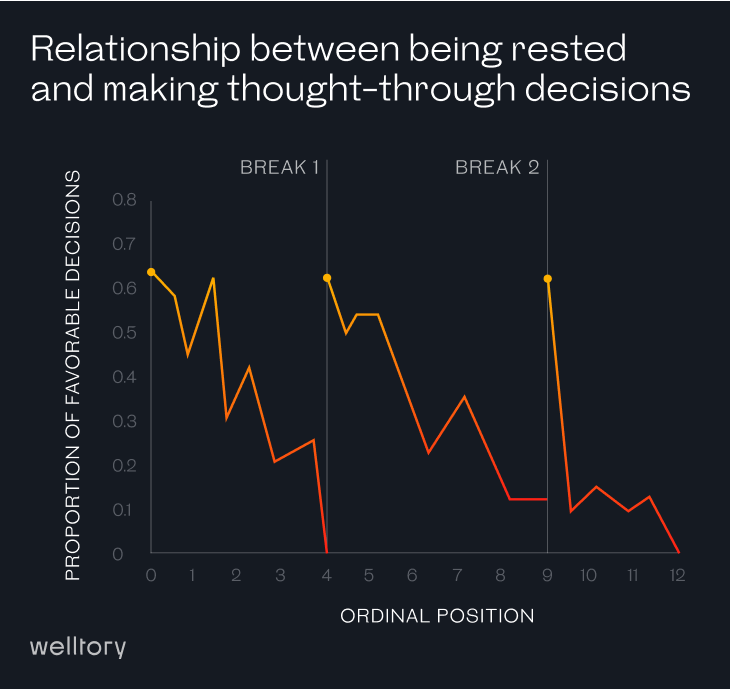
A prisoner’s chances of parole start off fairly high (around 65%) and quickly plummet within the span of just a few hours. The pattern repeats after each break.
So the decision-making part of the brain is kind of like a muscle – the more we work it, the more tired it gets. Dr.Amantha Imber, an organizational psychologist, recommends making major decisions around 11 am whenever possible. If you have to make an important decision later in the day, make sure to schedule a break beforehand.

Stress is one of the main triggers responsible for turning off the prefrontal cortex and making us act irrationally. Brain researchers call this phenomenon cortical inhibition. Stress exacerbates cognitive biases. When we’re stressed, we fall back on intuition and scale back conscious reasoning – a shift referred to as “stress induced deliberation-to-intuition” (SIDI). For example, people who are stressed are usually much more optimistic about their decisions and take more risks.
Research on securities traders by Andrew Lo and Dmitry Repin suggests that emotional responses are a significant factor in the real-time processing of financial risks, even among the most rational investors in the economy.
However, there are gender differences. Studies show that women are less likely to engage in risky behavior under stress than men. It’s possible these differences happen because men are more likely to initiate an attack when under threat. Women opt for the “flight” response, which is strategically wiser and less energy-consuming.
Stress can have such a detrimental effect on your ability to think rationally that it will ultimately lead to missteps and poor business decisions. In fact, researchers from Mindlab (UK) have found that stress makes us behave similarly to toddlers.
That’s why Tyler Tervooren, founder of Riskology.com, recommends avoiding making big judgment calls under stress altogether.
“It doesn’t matter what kind of or how much stress you’re under,” Tervooren says, “If you’re feeling it, you’re going to slip up when it comes to making good choices.”
According to Y-combinator co-founder Paul Graham, the reason most startups fail is simply because the founders become demoralized.
Moral of the story? Your brain is one of the most important tools in a startup, which is why you need to make sure it functions properly. When you’re under chronic stress, your brain is flooded with hormones that kill your attention span, impair memory, and lead to bad judgment calls.
If you’re worried that stress might be clouding your judgement, here are some warning signs to look out for:
All of these are signs that your brain has given up and you need time to rest and recover.

Some general work rules to stick to:
Welltory Team, 23 Dec. 2021

The number of chronic procrastinators has quadrupled over the past 25 years. Why is there a procrastination epidemic?

Flow is a state of mind available to virtually everyone in both work and leisure. There are a number of things you can try in order to expand your capacity to enter flow.
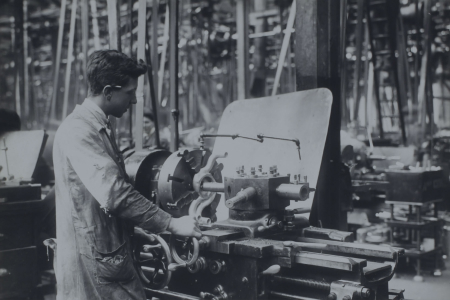
Find out how you can benefit from tracking your productivity and what you can start with.

Creative people have the courage and vision to make unorthodox decisions. Find out whether genes determine your creativity and how to flourish with ideas.
 App Store
App Store
 Google Play
Google Play
 Huawei AppGallery
Huawei AppGallery
 Galaxy Store
Galaxy Store







